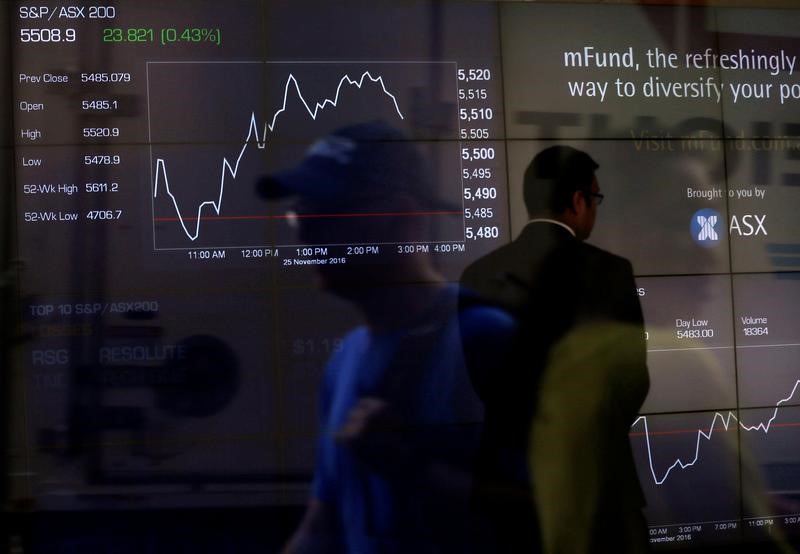Street Calls of the Week
The Australian share market is likely to rise in morning trade, with ASX futures up 0.3%, after two of Wall Street's main indices reached fresh record highs.
The movements themselves were modest – the S&P 500 gained 5.7 points or 0.1% and the Nasdaq rose 51 points or 0.3% while the Dow Jones eased by 31 points or 0.1%.
US markets were driven higher by tech stocks, including Nvidia (up 1.9%) and Intel (NASDAQ:INTC) (up 6.2%).
Other leading tech gainers included Super Micro Computer and Intel, both up 6%, and Advanced Micro Devices (NASDAQ:AMD), up 4%. On the downside, Chipotle fell 5% and Nike (NYSE:NKE) slipped 3%.
Where to next for US inflation?
Investor attention was focused on Federal Reserve chair Jerome Powell's two-day testimony before congressional committees starting tonight.
Eyes will also be trained on consumer and producer inflation reports later in the week, and the onset of the second-quarter company earnings season at the week's end.
Meanwhile, the New York Federal Reserve reported that median one- and five-year-ahead inflation expectations both declined by 0.2% in June, to 3.0% and 2.8%, respectively.
European share markets retreated on Monday after last week's solid gains. Political events in France were welcomed and seem to be contributing to fiscal discipline and a decline in bond yields.
Energy and mining sectors underperformed, with concerns over near-term Chinese demand prospects. Rio Tinto (ASX:RIO) and Anglo American (JO:AGLJ) each fell 1%, while Glencore (LON:GLEN) lost 0.8%.
The continent-wide FTSEurofirst 300 index eased by 0.1% and the UK FTSE 100 index fell 10 points or 0.1%.
Australian retail sector up
The recent surge in retail activity, driven by significant discounts from clothing and footwear retailers and early sales seasons, has heightened expectations of an August rate hike despite ongoing cost-of-living challenges.
According to the Australian Bureau of Statistics, retail spending rose by 0.6% in May and 1.7% year-over-year.
Currencies and commodities
Most currencies eased against the US dollar on Monday.
The Euro rose from a low of US$1.0814 to US$1.0845 before retreating to US$1.0825 by the US close.
The Australian dollar traded in a narrow range, rising from US$0.6740 to US$0.6751 and was near US$0.6736 at the US close. The Japanese yen was little changed at 160.80 per US dollar.
Commodity prices generally moderated on Monday. Participants debated potential new measures by China to support economic activity at the Third Plenum from July 15 to 18.
Copper eased by 0.8% after last week's surge and aluminium prices fell 0.1% due to easing oversupply concerns.
Global oil prices gave up early gains, with Hurricane Beryl's impact on Gulf of Mexico oil operations being less severe than feared.
Brent crude fell by US$0.79 or 0.9% to US$85.75 a barrel and US Nymex crude declined by US$0.83 or 1% to US$82.33 a barrel.
Gold prices retreated from six-week highs, influenced by speculation of potential Federal Reserve interest rate cuts.
- The gold futures price fell US$34.20 or 1.4% to US$2363.50 per ounce, while spot gold was trading near US$2358.80 per ounce.
- Iron ore futures ended down US$1.29 or 1.2% at US$110.02 per tonne.
Market snapshot
- ASX SPI futures: +0.3% to 7,771 points.
- ASX 200 (Monday close): -0.8% to 7,763 points.
- Australian dollar: -0.2% to 67.35 US cents.
- Wall Street: Dow Jones (-0.1%), S&P 500 (+0.1%), Nasdaq (+0.3%).
- Europe: FTSE (-0.1%), DAX (flat), Stoxx 600 (flat).
- Spot gold: -1.4% to $US2,359/ounce.
- Brent crude: -1% at $US85.68/barrel.
- Iron ore: -1.7% to $US108.50/tonne.
- Bitcoin: -0.2% to $US56,524.
Source: ABC.
